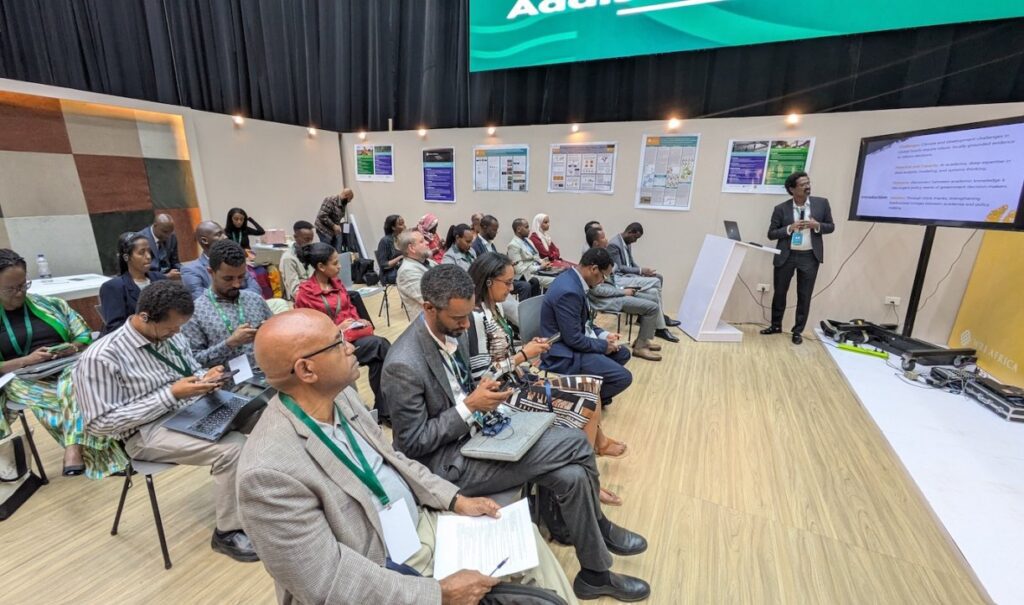Addis Ababa University and WRI Collaborate on Green Economic Modeling
Introduction to the Research Hub Program
Addis Ababa University’s (AAU) Department of Economics, in collaboration with the World Resources Institute (WRI), has recently achieved significant milestones in its Research Hub Program. This initiative focuses on systems thinking and green economic modeling, aiming to equip Ethiopia with the necessary tools for addressing its climate and economic challenges. Supported by WRI’s National Climate Action (NCA) initiative, this program sets the stage for the next generation of climate and economic modelers in Ethiopia.
Advancements in Green Economy Education
Over the last two years, AAU has pushed the boundaries of green-economy modeling and systems thinking, thanks to the detailed training and curriculum developed in partnership with WRI. Academic staff at AAU have gained expertise in system dynamics, enabling them to tackle complex climate and economic issues effectively.
Scholarships and Specialized Training
As part of this initiative, ten master’s students have been awarded full scholarships to specialize in applied economic modeling relevant to policy and planning. Their research spans critical themes such as:
- Green Employment
- Agricultural Productivity
- Sustainable Transport
- Urban Waste Management
These students have also engaged in professional training with practitioners from government institutions. Their involvement in academic seminars creates a bridge between theoretical research and practical policy implementation.
Supporting Ethiopia’s Climate Goals
This collaborative effort is crucial for embedding analytical and modeling capabilities within Ethiopia’s higher education landscape. By integrating the Green Economy Model into academic curriculums, AAU and WRI are equipping the nation to design, assess, and implement strategies that promote climate resilience and low-carbon development.
A Hub of Excellence
The Research Hub has transformed into a national and regional center of excellence, fostering partnerships between research, policy, and practice. It empowers a new generation of economists and climate analysts to collaborate with institutions like the Ministry of Planning and Development (MoPD) and the Environmental Protection Authority (EPA). This cooperation is essential for advancing Ethiopia’s vision for achieving net-zero emissions by 2050.
Enhancing Collaboration and Skills Development
WRI’s partnership with AAU has led to enhanced academic and professional training in systems thinking and green economic modeling. Training sessions have included participants from MoPD, EPA, and the Ministry of Finance, focusing on improving cross-agency collaboration and analytical skills.
Building a Learning Community
Through guest lectures and seminars, the Research Hub has cultivated a vibrant educational environment for students, faculty, and policymakers. Graduates have showcased their research findings in venues like WRI Ethiopia, receiving valuable technical feedback from industry experts. The partnership was also presented at the second African Climate Summit, highlighting how academic research can effectively shape national and regional climate policies.
Long-Term Impact of Collaboration
The AAU-WRI Research Hub exemplifies how sustained partnerships can fortify institutional capacities and lay the groundwork for evidence-based policymaking. By training professionals in modeling and analysis, the initiative ensures that Ethiopia’s development strategies are driven by reliable data and measurable outcomes.
“This collaboration has not only trained experts, but it has also established a long-term foundation for climate modeling that will continue to serve Ethiopia’s policy processes for years to come.”
This sentiment underscores the project’s commitment to capacity building and sustainable impact.
Future Prospects for the Research Hub
In light of its successes, WRI and AAU are looking to expand the Research Hub’s curriculum by introducing new modeling modules. This curriculum will align with Ethiopia’s emerging Climate Data Hub, which tracks and monitors data that feed directly into Green Economy Model projections.
The next steps will focus on fostering new master’s and doctoral researchers, thereby reinforcing the hub’s role as a critical center for innovation and learning, while furthering collaboration between universities and government entities.
Prioritizing Policy-Relevant Research
Upcoming phases aim to produce high-quality policy-relevant research and enhance access to data-driven tools for climate planning. Through ongoing partnerships, WRI and AAU aspire to bolster Ethiopia’s analytical capabilities, ultimately supporting the country’s broader development goals.
For more insights on innovative climate solutions and economic strategies, visit resources such as WRI and Addis Ababa University.
